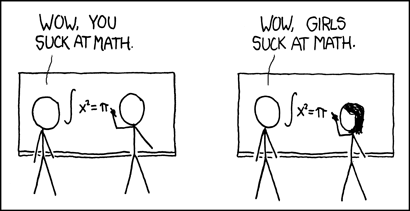My definition of a ‘lab’ is simply a group of people who do the science in question — and people are a varied bunch, indeed. But I wager that most scientists would not necessarily give much dedicated thought to the diversity of the people in their lab, and instead probably focus more on obtaining the most qualified and cleverest people for the jobs that need doing.

For example, I have yet to meet an overtly racist, sexist, or homophobic scientist involved actively in research today (although unfortunately, I am sure some do still exist), so I doubt that lab heads consciously avoid certain types of people when hiring or taking on new students as they once did. The problem here is not that scientists tend to exclude certain types of people deliberately based on negative stereotypes; rather, it concerns more the subconscious biases that might lurk within, and about which unfortunately most of us are blissfully unaware. But all scientists must be aware of, and seek to address, their hidden biases.
It is time to place my cards on the table: I am a middle-aged, Caucasian, male scientist who has lived in socially inclusive and economically fortunate countries his entire life. As such, I am the quintessential golden child of scientific opportunity, and I am therefore also one of the biggest impediments to human diversity in science. I am not able to change my status per se; however, I can change how I perceive, acknowledge, and act to address my biases.
The earlier scientists recognise these challenges in their career, the more effective they will be.
Gender balance
I acknowledge that as a man, I am already on thin ice discussing gender inequality in science today, for it is a massive topic that many, far more qualified people are tackling. But being of the male flavour means that I have to, like an alcoholic, admit that I have a problem, and then take steps to resolve that problem. After all, privilege is generally invisible to those who have it. If you are a male scientist reading this now, then my discussion is most pertinent to you. If you are female, then perhaps you can use some of these pointers to educate your male colleagues and students.
There is now ample evidence that science as a discipline is just as biased against women as most other sectors of professional employment, even though things have improved since the bad old days of scientific old-boys’ clubs. Journals tend to appoint more men than women on their editorial boards, and that editors display what is known as homophily when selecting reviewers for manuscripts: the tendency to select reviewers of the same gender as themselves.
Likewise, experimental evidence demonstrates that scientists in general rate male-authored science writing higher than female-authored works, and that academic scientists tend to favour male applicants over females for student positions. In the United Kingdom, as I suspect is more or less the case almost everywhere else, female academics in science, engineering, and mathematics also tend to have more administrative duties, and hence, less time to do research; they also have fewer opportunities for career development and training, as well as earning a lower salary, holding fewer senior roles, and being less likely to be granted permanent positions.
Read the rest of this entry »


